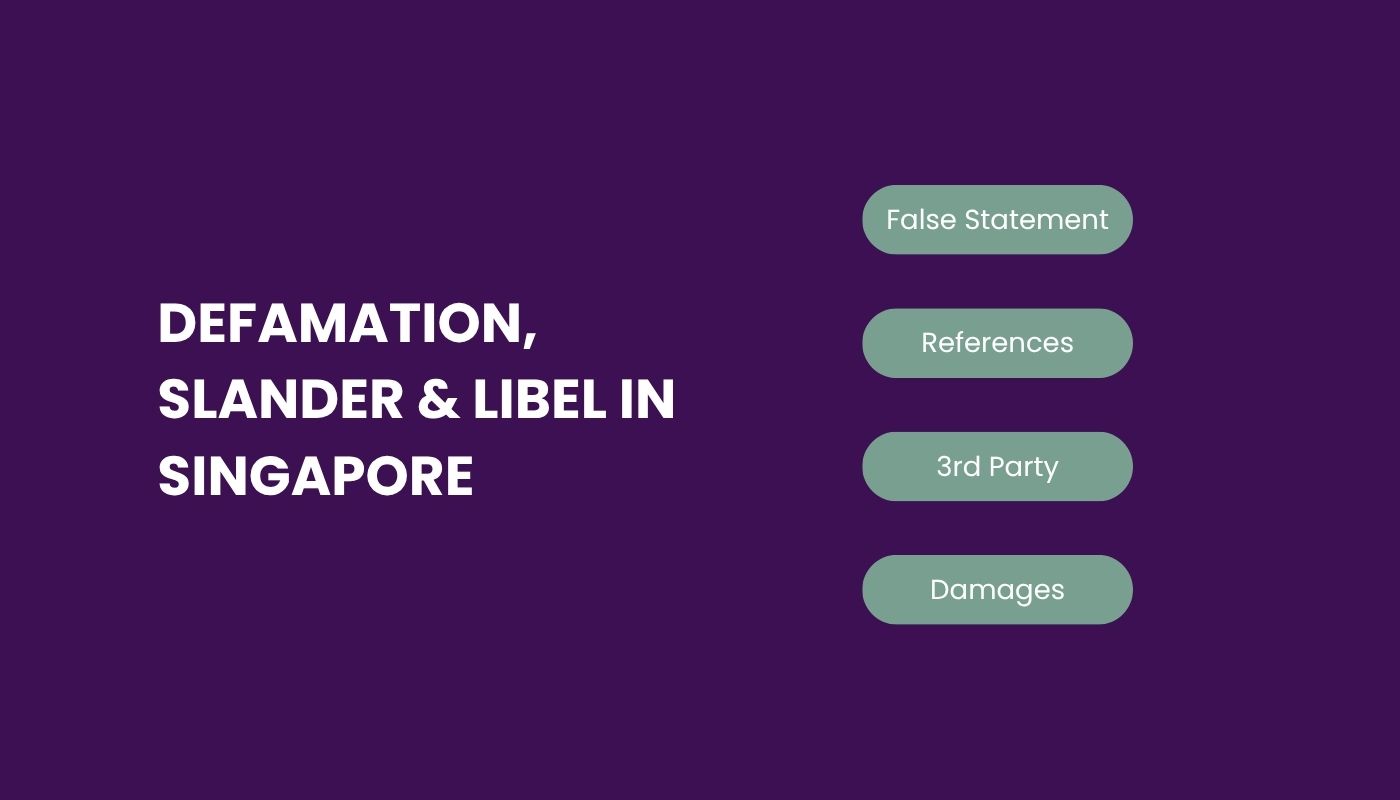General |
Defamation, Slander & Libel Laws in Singapore

False Statements & Your Reputation
Imagine someone casually spreading false, damaging statements about you at work, within your community, or online. Even if the words are spoken briefly, the harm to your reputation can be deep and lasting.
This is the essence of slander, a form of defamation that involves spoken falsehoods.
In Singapore, protecting your reputation is taken seriously, especially in an age where misinformation can spread quickly.
Understanding what slander is and what you can do about it can help you safeguard your good name and take informed legal action if necessary.
What Constitutes Defamation?

Defamation encompasses false statements that harm someone’s reputation. In Singapore, defamation law draws from common law principles and incorporates provisions of the Defamation Act 1957. The law recognizes two primary forms: libel which involves written or published false statements, and slander which concerns spoken defamatory words.
For a statement to qualify as actionable defamation, it must be communicated to at least another third party, clearly reference the complainant, and either cause or have the potential to cause reputational harm. The statement must be presented as fact rather than mere opinion, and it must lower the complainant’s standing in the eyes of right-thinking members of society.
What is Slander?
Slander is a false statement made about an individual or entity which could harm the individual’s or entity’s reputation. While one may assume that they are free to make a statement to express his/her opinion, it must be understood that an opinion made with no basis or that cannot be substantiated or reasoned could be slander if it harms the reputation of the person or entity to whom the statement is directed at.
Common Scenarios Where Slander Happens
Slander can arise in everyday conversations more often than you might think. Here are some real-world examples:
| Scenario | What Typically Happens |
| Workplace gossip | A colleague falsely accuses someone of dishonesty or misconduct. |
| Business competition | A rival spreads unfounded rumors to damage another business’s reputation. |
| Personal disputes | False accusations made in social settings harm a person’s standing among peers. |
| Online audio discussions | False statements made during podcasts, webinars, or live streams. |
| Public speaking events | Defamatory claims made during speeches, meetings, or public debates. |
Even informal or offhand remarks may amount to slander if they unjustly harm someone’s reputation.
Establishing a Slander Claim:
For a successful slander claim in Singapore, the following elements usually must be established:
- False Statement
The statement must be factually untrue—not merely opinion or fair criticism. - Reference to the Victim
The defamatory words must clearly refer to the person bringing the claim. - Publication to a Third Party
The statement must be communicated to someone other than the victim. - Damage to Reputation
The victim must show that the statement caused, or was likely to cause, harm to their reputation, affecting how others view them. - Special Damage (in some cases)
For many slander cases, proof of actual loss (e.g., financial loss, job loss) is needed unless the statement falls into serious categories like accusations of crime, disease, or professional misconduct.
Slander vs Opinion: Responsible Expression
To avoid engaging in slander and its potential legal repercussions in Singapore, it is essential to keep the following in mind:
- Verify the information you are acting on: Before making statements about anyone, ensure that the information you speak about is accurate. Relying on credible sources and conducting thorough research could help prevent the spread of false information.
- Exercise Caution in Public Discussions: When engaging in public discussions or social media interactions, be mindful of the language you use and the potential impact of your words. Always express opinions based on facts and avoid making baseless statements
- Practice Responsible Sharing: In today’s age of AI & Social Media, false information may spread like wildfire. Always verify the credibility and accuracy of the content you come across before sharing your views on social media. Taking the time to verify information creates a better understanding of true circumstances and could prevent any potential slanderous behaviour .
Why Early Legal Advice Matters in Slander Cases ⏳
Many slander victims adopt a wait-and-see approach, hoping damaging rumors will naturally dissipate. This strategy often proves counterproductive. Swift legal consultation offers several advantages that can significantly impact case outcomes.
Evidence preservation becomes critical as time passes. Witness recollections fade, recordings may be deleted, and circumstances change in ways that make fact reconstruction difficult. Early action helps secure crucial proof while it remains available and reliable.
Professional legal assessment clarifies whether reputational or financial harm can be properly quantified and documented. Lawyers experienced in defamation matters can evaluate whether your situation meets the legal threshold for successful claims and identify the most effective remedies.
Timely intervention through formal communications such as cease-and-desist letters or demands for retraction can produce immediate results. These steps often deter continued defamatory statements and may secure apologies or retractions without requiring full litigation. Early decisive action demonstrates seriousness while potentially containing damage before it spreads further.
How RBN Chambers Can Help with Slander and Defamation ?️
At RBN Chambers, we understand how distressing it is to suffer reputational harm from false statements.
We provide clear, strategic advice on assessing slander claims, gathering evidence, sending letters of demand, negotiating settlements, and pursuing litigation if necessary. Our team has extensive experience helping individuals, professionals, and businesses protect their reputation effectively and sensitively.
If you believe you have been a victim of slander, RBN Chambers is ready to help you explore your legal options and defend your good name.
Frequently Asked Questions
What is the difference between slander and libel?
The distinction lies in the medium. Slander involves spoken false statements, while libel concerns written or otherwise permanently recorded defamatory content.
Can I sue someone for slander even if the statement was made casually?
Yes. Slander claims can proceed regardless of whether the speaker considered their statement casual or insignificant, provided the legal elements are satisfied—the statement was false, communicated to others, and damaged your reputation.
Do I need to prove financial loss to sue for slander?
In many cases, yes—unless the false statement accuses you of a crime, disease, professional misconduct, or similar serious matters.
What if the person apologises?
An apology can help mitigate damages, but it does not erase the harm done to your reputation. You may still have the right to claim compensation.
How can RBN Chambers assist with slander cases?
We help assess your situation, gather evidence, draft letters of demand and represent you if formal legal action is necessary.

Delivering Solutions not just Answers to your legal disputes
We provide solutions to the table for all our clients regardless of the scale or complexity of the cases. Let us know how we can help.
Contact UsAny information of a legal nature in this blog is given in good faith and has been derived from resources believed to be reliable and accurate. The author of the information contained herein this blog does not give any warranty or accept any responsibility arising in any way, including by reason of negligence for any errors or omissions herein. Readers should seek independent legal advice.

